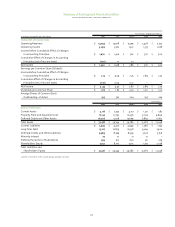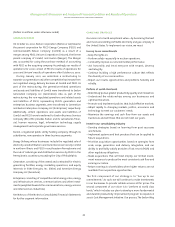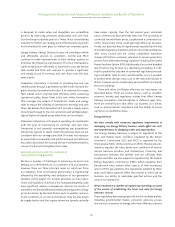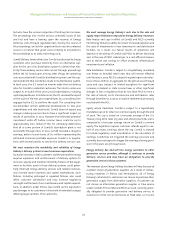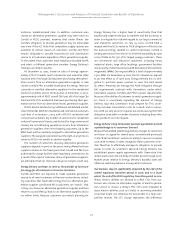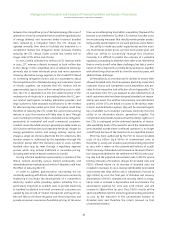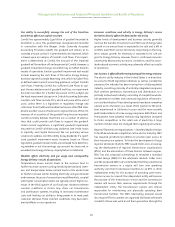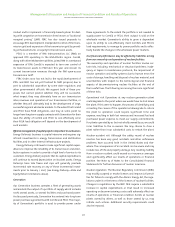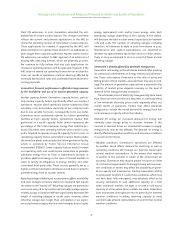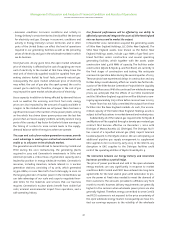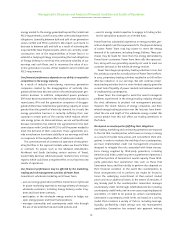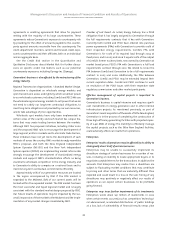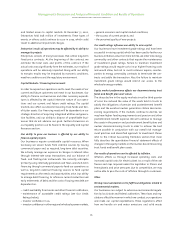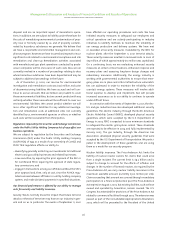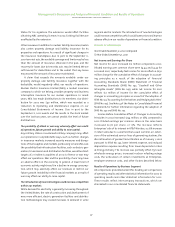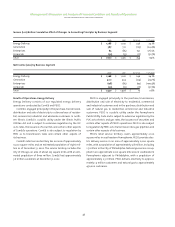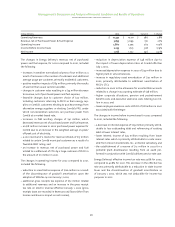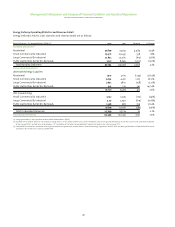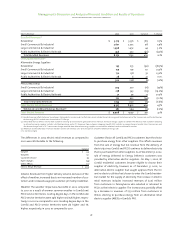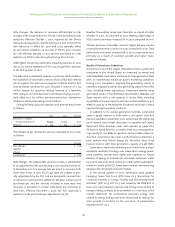ComEd 2002 Annual Report Download - page 34
Download and view the complete annual report
Please find page 34 of the 2002 ComEd annual report below. You can navigate through the pages in the report by either clicking on the pages listed below, or by using the keyword search tool below to find specific information within the annual report.
– Economic conditions. Economic conditions and activity in
Energy Delivery’s service territories directly affect the demand
for electricity and gas. Changes in economic conditions and
activity in Energy Delivery’s service territories and in other
parts of the United States can affect the level of operations
required in our generating facilities as well as the prevailing
prices of electricity and gas in the wholesale markets in which
we do business.
Fossil fuel costs. At any given time, the open market wholesale
price of electricity is affected by the cost of supplying one more
unit of electricity to the market at that time. Many times the
next unit of electricity supplied would be supplied from gen-
erating stations fueled by fossil fuels, primarily natural gas.
Consequently, the open market wholesale price of electricity
may reflect the cost of gas plus the spark spread, the cost to
convert gas to electricity. Therefore, changes in the cost of gas
may impact the open market wholesale price of electricity.
Excess capacity. In addition to being affected by demand factors
such as weather, the economy, and fossil fuel costs, energy
prices are also impacted by the amount of supply available in
a region. In the markets where we sell power, there has been a
significant increase in the number of new power plants coming
on-line which has driven down power prices over the last few
years.In fact,an “excess supply”problem currently exists in many
parts of the country. A key factor for Exelon’s future earnings is
the timing of a return to more normal levels in the supply-
demand balance within the regions where we operate.
The scope and scale of our nuclear generation resources provide
a cost advantage in meeting our contractual commitments and
enable us to sell power in the wholesale markets.
The generation assets transferred to Generation by ComEd and
PECO during the 2001 restructuring, the generating plants
acquired in 2002 and Generation’s investments in Sithe and
AmerGen provide a critical mass of generation capacity and a
leadership position in energy wholesale markets. Generation’s
resources, including AmerGen, include interest in 11 nuclear
generation stations, consisting of 19 units, which generated
125,916 GWhs, or more than half of our total supply in 2002. As
the largest generator of nuclear power in the United States,we
can take advantage of our scale and scope to negotiate favor-
able terms for the materials and services that our business
requires. Generation’s nuclear plants benefit from stable fuel
costs, minimal environmental impact from operations, and a
safe operating history.
Our financial performance will be affected by our ability to
effectively operate and integrate the assets of Sithe New England
into our business and to market the output.
In November 2002, Generation acquired the generating assets
of Sithe New England Holdings, LLC (Sithe New England). The
Sithe New England assets, now known as the Exelon New
England Holdings assets, include 2,421 MWs of gas-fired com-
bined facilities under construction and several operating
generating facilities, which together with the assets under
construction total 4,066 MWs of capacity. The facilities under
construction (Mystic 8,Mystic 9, and Fore River) are currently in
the final stages of construction and testing. We anticipate
commercial operation dates during the second quarter of 2003.
These projects have experienced delays in construction and any
further delays could adversely affect our results.See further dis-
cussion of the Sithe Boston Generation Project Debt in Liquidity
and Capital Resources.With the continued low wholesale energy
prices, we anticipate that the effects of our Sithe investment
and the Sithe New England acquisition will be dilutive to earn-
ings by approximately $125 million before income taxes in 2003.
Power Team has not fully committed the output from these
facilities into the New England markets. As such, the uncom-
mitted capacity of the Exelon New England Holdings assets is
subject to the fluctuations in marketdemand and market prices.
Substantially all of the natural gas requirements for Mystic 8
and Mystic 9 will be supplied through a twenty-year natural gas
contract that became effective on December 1, 2002 with
Distrigas of Massachusetts, LLC (Distrigas). The Distrigas facili-
ties consist of a liquefied natural gas (LNG) import terminal
located adjacent to the Mystic station. We are anticipating an
additional pipeline gas supply arrangement to supplement
LNG supplies to be in service by early 2005. In the interim, any
disruption in LNG supplies to the Distrigas facilities could
restrict the operating abilities of Mystic 8 and Mystic 9.
The interaction between our Energy Delivery and Generation
businesses provide us a partial hedge.
The price of power purchased and sold in the open wholesale
energy markets can vary significantly in response to market
conditions. Both ComEd and PECO have entered into long-term
agreements for the next several years with Generation to pro-
cure the power at fixed rates needed to meet the demand of
their customers. The amounts provided to affiliates vary from
month to month; however, delivery requirements are generally
highest in the summer when wholesale power prices are also
generally highest.Therefore,energy committed to serve ComEd
and PECO customers is not exposed to the price uncertainty of
the open wholesale energy market. Consequently, we have lim-
ited our earnings exposure to the volatility of the wholesale
Management’s Discussion and Analysis of Financial Condition and Results of Operations
exelon corporation and subsidiary companies
32



